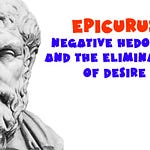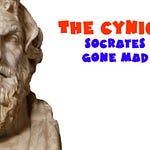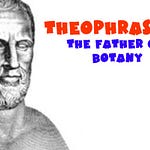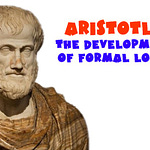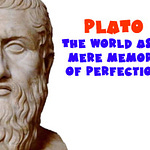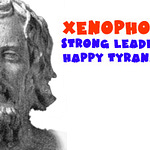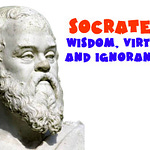Paid subscribers will have access to this and all other videos and bonus content. Please consider upgrading to a paid subscription to enjoy and support this project. If you pay to subscribe I’ll also read your name out at the end of the video.
You can also obtain the benefits of a paid subscription by sharing Three Minute Philosophy with others. For each new friend you bring in, you earn benefits. So spread the word!
For the full archive of videos so far, visit https://www.speterdavis.com/philosophy/
Democritus of Abdera was a Greek philosopher who lived around 400 BC in northern Greece.
Despite the common misconception, Democritus is not the inventor of democracy. That was George Washington (just kidding). The name is just a coincidence, but what Democritus did come up with was a theory about the universe that eerily resembles the one we now know to be correct.
Along with his mentor Leucippus, Democritus developed the theory of atomism, which is the idea that all matter is made up of tiny little indivisible particles.
Much like Empedocles, the inspiration for the theory of atoms was more or less an attempt to prove Parmenides and Zeno wrong. According to the Eleatics, it should be impossible for anything to move because any distance between two places is composed of infinitely divisible smaller distances.
Given that we know things actually do move, Democritus thought this was a problem that needed to be solved, and he theorised that there must actually be a smallest possible distance that anything can move.
Think of it like the pixel resolution of the universe.
In another departure from Parmenides, Democritus reinstated the idea that there is such a thing as empty space. According to him everything that exists is made up of atoms, the smallest indivisible building blocks of reality, and apart from atoms there is only void.
He agreed with Parmenides that defining things requires you to have something to compare things against, but in Democritus’ worldview this demanded the idea of empty space to define the concept of reality. And even though sounded very clever to use logical reasoning to arrive at the conclusions that space doesn’t exist and there is no movement, Democritus thought that it was more useful to start with what we can observe to be true and work back from there.
So Democritus started what he thought were the uncontroversial facts about reality and took bits and pieces from previous philosophers to try to construct a coherent worldview that works.
For example, he took the classical elements idea from Empedocles and the Ionians and used it as a template for his theory of atoms—that everything in the material world was made up of tiny little indivisible fragments of these four things. He even agreed with Heraclitus about the idea that the human soul was made up of atoms of fire.
It’s tempting to make the claim that Democritus actually came up with modern atomic theory over two thousand years before it was scientifically accepted, but it’s important to understand that what Democritus believed about atoms and what scientists now accept aren’t really the same thing.
He didn’t have any theories about electrons or energy levels or any of that kind of thing. He was just using observation and reasoning to come to a conclusion that seemed to follow from the evidence available, but it wasn’t for a very long time that scientists came to a similar conclusion separately through mathematics and modern experimentation and although the truth about atoms is different in many ways they decided to keep Democritus’ name for them. Democritus therefore left one of the most enduring scientific legacies in human history and in retrospect it would be more entertaining for us today if instead of atoms he’d decided to call them fomblewhackers or bollywogs.
In fact what Democritus represents is the end of a tradition in ancient Greek philosophy as he was the last of the great classical materialists. From the mythological origins of Greek philosophy through to now the core of it had always been trying to figure out what all this stuff is made of and how we can define it.
With Democritus’ atomism materialist philosophy didn’t really have anywhere left to go, so philosophy kind of clapped him on the back and said good work Democritus and then stopped thinking about this stuff for the next two thousand years.
After this the entire landscape of philosophy was about to change dramatically with the arrival of somebody named Socrates. But that’s for another episode.
Sources:
Warren, James., Presocratics. Acumen, 2007
Adamson, Peter., Classical Philosophy: A history of philosophy without any gaps. Oxford University Press, 2014
Berryman, Sylvia., Democritus. Stanford Encyclopedia of Philosophy, 2023.
What you get for subscribing:
Three Minute Philosophy is a fun and educational series of videos and essays about the history of philosophy.
Essays are free. Paid subscribers will gain access to full videos, printable PDFs, and possibly more in time.





